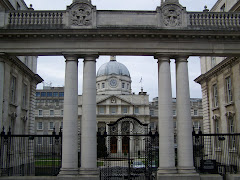Billy Elliot that is.
It made me laugh, cry, and gasp with sheer astonishment at the dancing - especially that of the lad who played Billy.
The background to the story, set as it is in Easington, County Durham, as I guess everyone knows is the 1984 Miners' Strike. It is the more poignant seeing the fight to save the pits being enacted when we all know fully well what happened to our coal industry and those communities where coal mining had been the life blood of the community. I studied social and economic history when I was at Hull. I imagine this strike will be studied as a defining moment in our history for as long as the history of the 20th Century is studied. I start to feel old when I realise that anyone younger than about 25 will have no memories of this strike, when it seemed more like civil war was going on between the industrial north and the Tory government in the south than an industrial dispute. We decided that we should play our part and declared 'They shall not starve' and did some fund raising which was a bit of a pain on a wet Saturday morning in Wood Green but let's be honest - not as much as a pain as having no salary for a whole year when you never had much in the first place.
I also think the bitterness will continue for generations. The reason that for example Chesterfield football club hates Mansfield F.C. so much is far more than local rivalry - Chesterfield miners mostly stayed out - many Nottingham miners worked. Many supporters of other sides still chant at Mansfield fans - 'You're scabs -and you know you are.'
I remember huge rows with mates who though they supported the miners saw more quickly than I did that Scargill's tactics were a disaster. I couldn't bring myself to imagine the miners losing after such a struggle, but looking back I have to admit it wasn't exactly text book stuff on how to win an industrial dispute.....
No 1. Call strike when coal had been stockpiled and do so in March as it starts to get warmer and therefore the demand for coal will be lower.
No 2. No, on second thoughts - really don't want to revisit all that here.
Back to Billy who is the gifted working class kid with artistic ambitions seemingly beyond his reach - but he succeeds just as the miners lose their year old struggle (the moment when I started to weep for the second time last night).
I am not alone in being a soppy old sod by the way- according to Elton John in the programme when he left the premiere of the film in Cannes he says "I had to be helped up the aisle sobbing." Quite an image :-)
There is a helpful section in the programme by the way- aimed I imagine at Americans and Cockneys - under the heading 'Translation'. To fulfill a useful public education role I bring you the following words which may come in handy should you find yourself north of Middlesborough. ( Messalina, I am thinking of you. )
'Cannut' - Second syllable unstressed, means 'can't' as in 'I
cannut bear it man.'
'Howay'- 'How-way' means 'come on' as in '
Howay, I want to show you something.
'Awa' - Pronounced 'hour', means 'over' as in 'Admittedly the sausages are a bit
awa done'.
Ok - bored with that now.
So contrasting emotions at the end - sadness and regret for the mining communities and what their future will bring alongside exhilaration that Billy will escape all that and have a wonderful future.
I leave you with the lyrics of a little song sang in the show by some of the village kids to a well known tune:
'O my darling, O my darling
O my darling Heseltine.
You're a tosser, you're a wanker,
And you're just a Tory swine.'

 rushes downstairs in dressing gown and curlers to demand 'Have I missed summat?'
rushes downstairs in dressing gown and curlers to demand 'Have I missed summat?'











